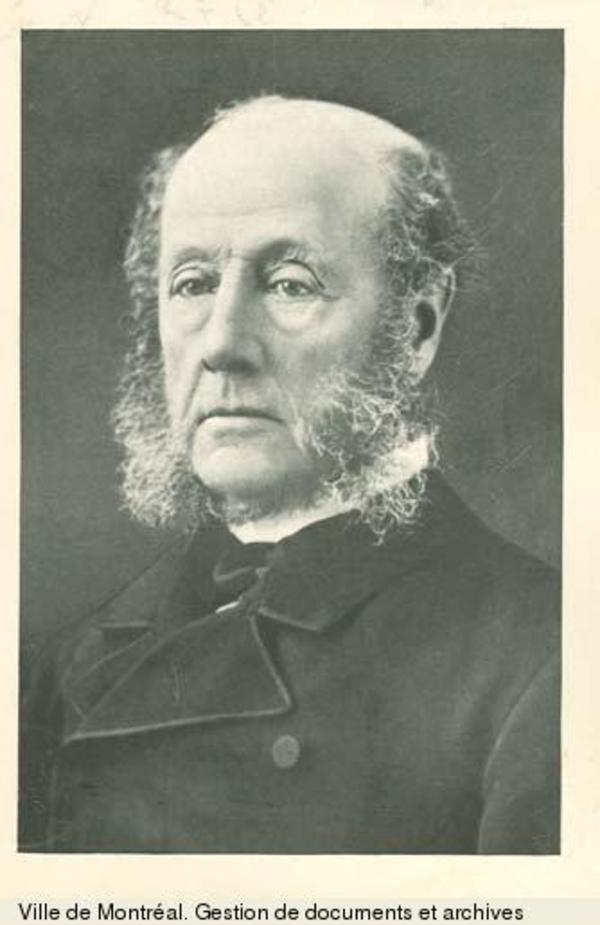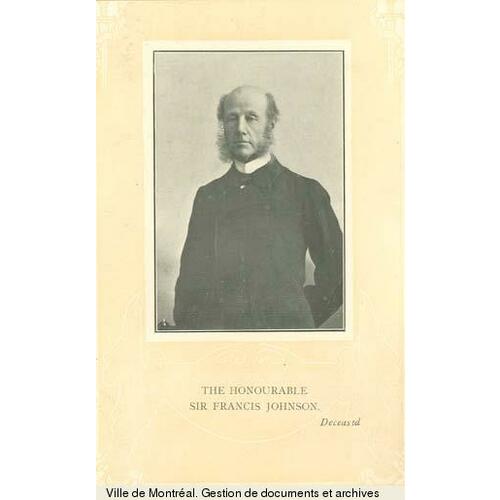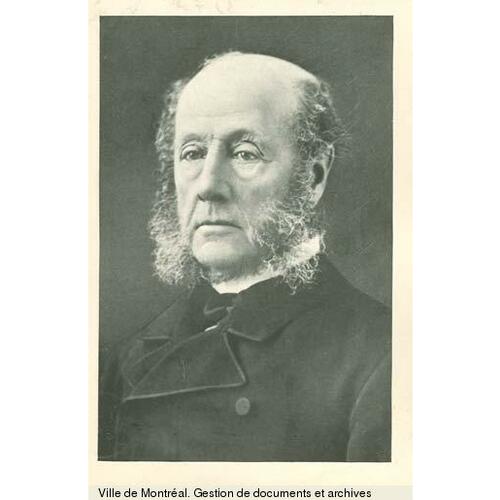
Source: Link
JOHNSON, Sir FRANCIS GODSCHALL, lawyer, judge, and office holder; b. 1 Jan. 1817 at Oakley House, Bedfordshire, England, fifth son of Captain Godschall Johnson of the 10th Hussars and Lucy Bisshopp, sister of Cecil Bisshopp*; m. 10 Sept. 1840 Mary Gates Jones in Montreal, and they had three children; m. secondly 4 March 1856 Mary Louisa Mills in the Red River settlement (Man.), and they had three children; d. 27 May 1894 in Montreal.
After attending Harrow, Francis Godschall Johnson went to Saint-Omer, France, and to Brugge, Belgium, to complete his formal studies. Thanks to his parents’ good sense, he obtained both a sound classical education and an excellent knowledge of English and French. After immigrating to Montreal, he was articled to lawyer Henry Peard Driscoll from November 1834 to May 1836. He completed his legal studies in the office of Charles Dewey Day* and became a partner there after being called to the bar on 22 Nov. 1839. That partnership gave way to another with Alexander Buchanan* lasting until December 1845. Johnson’s decision to move about was probably a wise one. Day served as deputy judge advocate at the trials of the Patriotes in 1838, and both he and Buchanan were appointed to the commission which revised and consolidated the statutes of Lower Canada in 1842. Johnson’s association with these two men doubtless partly explains his nomination, while a student, as translator to the military tribunal and later, when a young lawyer, as secretary to the commission on the statutes. His ability and his command of two languages were probably also factors. In the 1840s he gained wide recognition in Montreal legal circles as an excellent courtroom lawyer, specializing in criminal law. He was frequently retained for jury trials of importance.
Johnson’s accomplishments were recognized by his appointment as qc on 11 Feb. 1848. Elected a vice-president of the British American League [see George Moffatt*] in the spring of the following year, he was prominent in the tory campaign to prevent passage of the Rebellion Losses Bill and in the subsequent unsuccessful attempt to have it disallowed. He consequently signed the Annexation Manifesto. Because of his actions he suffered the loss of his qc, which was not restored until 5 July 1853.
On 3 Feb. 1854 the Hudson’s Bay Company commissioned Johnson recorder of Rupert’s Land. French-speaking Métis there had long pressed for a bilingual judge to replace Adam Thom*, and the company’s governor, Sir George Simpson*, concluded that Johnson was the best man available. In addition to presiding over the General Quarterly Court, he served as assessor and legal adviser to the governor and the HBC. On 19 July 1855 he became assistant governor of Assiniboia and four months later, on 26 November, he was appointed governor to succeed William Bletterman Caldwell*. During his four years as recorder, the court docket was never crowded; on four occasions sessions were cancelled for lack of cases. Roy St George Stubbs states that Johnson’s legal talents may have been wasted in the Red River settlement but that his presence as the personification of judicial authority probably had a salutary effect on the community. His term as governor was characterized by a period of calm in the settlement. Johnson was apparently well regarded by all elements of society.
Returning to Montreal in 1858, Johnson resumed private practice. The next year he became crown prosecutor for the district of Montreal. One of his most notable cases as prosecutor involved the trial in November and December 1864 of the men who raided St Albans, Vt [see Charles-Joseph Coursol*]. The raiders were defended by John Joseph Caldwell Abbott. On 1 June 1865 Johnson was appointed judge of the Superior Court for the district of Bedford, and he presided at the trial of participants in the Fenian raid of 1866.
In 1870 Johnson again travelled west, on this occasion to assist federal authorities at Red River following the troubles of 1869–70 [see Louis Riel*]. Sir George-Étienne Cartier* viewed him as the person best qualified to act as recorder until courts were set up in the new province and he prevailed upon Quebec to grant him a year’s leave. Johnson was sworn in as recorder of Manitoba on 19 Oct. 1870. While presiding over the General Quarterly Court, he sought at times to educate Manitobans in legal matters or to encourage action beneficial to society. Two days after he had assumed office, Lieutenant Governor Adams George Archibald named him to the Executive and Legislative councils of Rupert’s Land and the NorthWest Territories. The appointment was shortly withdrawn, since Archibald had unknowingly exceeded his powers in establishing the councils. Johnson’s legal talents none the less remained available to the governor. His leave of absence was extended because he accepted additional assignments. In 1870 the federal government had named him a special commissioner to prepare a report on the state of laws in force in Manitoba, and in 1871 it requested him to investigate and make recommendations respecting claims for losses suffered during the resistance.
By the spring of 1872 Archibald wished to resign. Federal authorities approached Johnson to take over as lieutenant governor. He did not desire the post, but agreed to assume it. Before he took office, however, his commission was revoked because of a motion introduced in parliament censuring the government for permitting an appointee to hold two salaried offices under the crown. Johnson learned of the development while in St Paul, Minn., and despite the awkwardness of his position he agreed to proceed to Manitoba and preside over its court for the upcoming session. According to the Manitoban of Winnipeg, it was ironic that the sole appointment of the federal government to cause universal satisfaction among Manitobans was reversed.
Johnson was appointed judge of the Superior Court in the district of Montreal on his return east in 1872. One of his contemporaries, Laurent-Olivier David*, stated that his talents would have been better employed in criminal cases. None the less, where questions of law were concerned Johnson could deliver acute and interesting judgements in superb French or English. Late in his career he acted as president of the Court of Review. In just recognition of his services he became chief justice of the Superior Court on 9 Dec. 1889 and was knighted on 30 June 1890.
Johnson’s death in 1894 brought to a close an eminently successful career. He had performed admirably in the tasks he had undertaken; except for the affair of 1849, he had always shown excellent judgement, and he was well regarded by all who had come to know him. In his early years he had established a reputation as an athlete; in later life he was known as a great wit.
ANQ-M, CE1-63, 10 sept. 1840. NA, RG 4, B8: 10313–29. L.-O. David, Mes contemporains (Montréal, 1894). Western Law Times (Winnipeg), 5 (1894), no.1: 63–64. Montreal Daily Star, 28 May 1894. P.-G. Roy, Les juges de la prov. de Québec. F.-J. Audet, Les juges en chef de la province de Québec, 1764–1924 (Québec, 1927). A. W. P. Buchanan, The bench and bar of Lower Canada down to 1850 (Montreal, 1925). R. St G. Stubbs, Four recorders of Rupert’s Land; a brief survey of the Hudson’s Bay Company courts of Rupert’s Land (Winnipeg, 1967).
Cite This Article
Clinton O. White, “JOHNSON, Sir FRANCIS GODSCHALL,” in Dictionary of Canadian Biography, vol. 12, University of Toronto/Université Laval, 2003–, accessed March 1, 2026, https://www.biographi.ca/en/bio/johnson_francis_godschall_12E.html.
The citation above shows the format for footnotes and endnotes according to the Chicago manual of style (16th edition). Information to be used in other citation formats:
| Permalink: | https://www.biographi.ca/en/bio/johnson_francis_godschall_12E.html |
| Author of Article: | Clinton O. White |
| Title of Article: | JOHNSON, Sir FRANCIS GODSCHALL |
| Publication Name: | Dictionary of Canadian Biography, vol. 12 |
| Publisher: | University of Toronto/Université Laval |
| Year of publication: | 1990 |
| Year of revision: | 1990 |
| Access Date: | March 1, 2026 |




